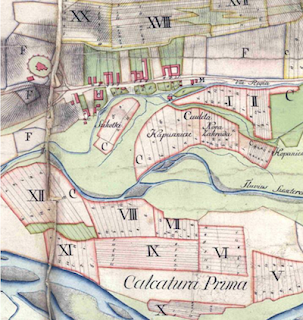Gavelkind was a system of partible inheritance; that is, estates were not kept together at the holder's death but distributed among the heirs—excuse me, among the male heirs. It was used in Kent, even after the Norman Invasion (through special arrangement), although the aforementioned other methods of inheritance applied elsewhere in England.
The holder of the land, if he were 15 years old or older, had authority to pass on part (or all) of his land and create his own mini-fiefdom. He could divide it any way he liked in his will. If he died intestate, however, other rules applied:
- His widow, if they had no children, got half the estate (the other half went to the crown); if she remarried, she lived with her new husband's estate and lost her deceased husband's land.
- In the case of existing children, the land was divided equally among the male heirs. If a son had died and left grandsons, they would divide their deceased father's share.
Gavelkind existed in Ireland and Wales, and this may explain the name. Traditional Irish law divided the father's land among all the sons. Best guess is that it is from the Old Irish phrase Gavail-kinne, "family settlement." In Wales this was called cyfran, an ancient tradition passed down orally until Hywel Dda, a king who ruled most of Wales by the time of his death around 950, codified the legal system. Cyfran stated that all sons would inherit equally, even those who were illegitimate. This was great for the heirs, but bad for the land. It diluted wealth and power, which some might consider good and democratic, but it also increased competition among siblings whose estate was a fraction of the one on which they grew up. In 1535, the Laws in Wales Acts replaced gavelkind with primogeniture. Actions replacing gavelkind are referred to as "disgavelling."
I said I'd discuss Knight-service as well, but it deserves its own entry, so...next time?


